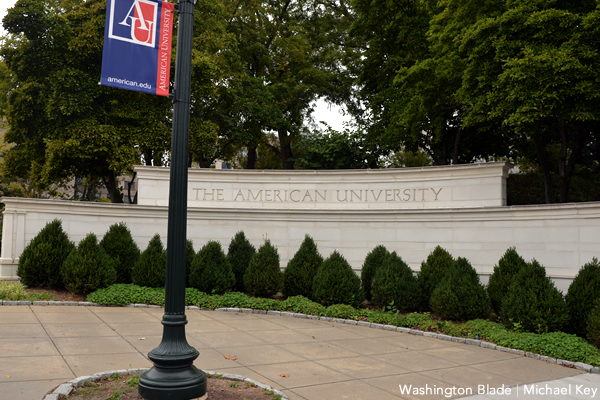Local
AU student expelled over arrest in attack on gay Asian man, parents
Patrick Trebat no longer affiliated with university

An American University graduate student who was arrested by D.C. police on Aug. 7 on charges that he assaulted a gay Asian man and the man’s parents while shouting homophobic and anti-Asian slurs “is no longer affiliated with the university and will not be allowed on campus,” according to a report by WTOP News.
In an Oct. 9 broadcast that it updated this week, WTOP said Patrick Trebat, 38, who had been taking a night class at the university’s Kogod School of Business, was banned from returning to the campus.
Charging documents filed in D.C. Superior Court show that Trebat was charged by D.C. police with one count of felony assault, two counts of simple assault and one count of destruction of property for allegedly assaulting and injuring Sean Lai, 30, an out gay man of Chinese ancestry, and his parents on the 3700 block of Fulton Street, N.W., on Aug. 7.
The charging documents say Trebat allegedly began to follow Lai and his parents as they were walking along the street in the city’s Observatory Circle neighborhood near the National Cathedral. According to a statement by a police official from the police district whose officers made the arrest, Trebat punched and kicked the three victims as he stated, “Get out of my country.” The police statement says the family was taken to a hospital for treatment of non-life-threatening injuries.
A separate police report says Trebat shouted the word “faggots” at the family and shouted, “You are not Americans!”
Based on these allegations, prosecutors classified the assault charges as an anti-Asian bias related crime, but they did not add an anti-gay classification to the charges.
Court records show that Trebat was released two days after his arrest while awaiting trial under the court’s High Intensity Supervision Program, which, among other things, imposed a curfew requiring him to return home by 10 p.m.
An Oct. 8 story in The Eagle, the American University student newspaper, says it learned that Trebat’s attorney filed a motion in court, which the Washington Blade also discovered from court records, asking a judge to extend the curfew deadline from 10 p.m. to 11:45 p.m. so that Trebat could attend at night class at American University.
The motion, which prosecutors with the U.S. Attorney’s Office did not oppose and the judge approved, identified Trebat in the public court records as an AU graduate student.
According to the Eagle, representatives of the university’s Asian American and LGBTQ student groups criticized university officials for not alerting students that an AU student charged with an anti-Asian hate crime while hurling homophobic slurs had access to the campus and could pose a danger to students.
“Patrick Trebant is not affiliated with American University and is not allowed on campus,” AU told the Blade on Wednesday in a statement. “While we cannot discuss details of an individual matter, when a student has been arrested, charged, convicted of, or sentenced for a felony crime, the university’s student conduct code provides for an administrative adjudication process. The safety of our students and our community is our priority.”
The Eagle reports that the code of conduct states that the dean of students or their designee can administratively adjudicate a case when a student has been accused of a non-academic offense “where the student has been arrested, charged, convicted of, or sentenced for a felony crime” for certain misconduct. The code of conduct applies in a situation in which a student is arrested for an off-campus allegation.
Court records show Trebat is scheduled to return to court at 9:30 a.m. on Nov. 15 for a felony status hearing before Superior Court Judge Judith Pipe.
Neither Trebat nor his attorney, Brandi Harden, could immediately be reached for comment.
District of Columbia
D.C. Black Pride theme, performers announced at ‘Speakeasy’
Durand Bernarr to headline 2026 programming

The Center for Black Equity held its 2026 DC Black Pride Theme Reveal event at Union Stage on Monday. The evening, a “Speakeasy Happy Hour,” was hosted by Anthony Oakes and featured performances by Lolita Leopard and Keith Angelo. The Center for Black Equity organizes DC Black Pride.
Kenya Hutton, Center for Black Equity president and CEO, spoke following the performances by Leopard and Angelo. Hutton announced this year’s theme for DC Black Pride: “New Black Renaissance.”
Performers for 2026 DC Black Pride were announced to be Bang Garcon, Be Steadwell, Jay Columbus, Bennu Byrd, Rue Pratt and Akeem Woods.
Singer-songwriter Durand Bernarr was announced as the headliner for the 2026 festivities. Bernerr gave brief remarks through a video played on the screen at the stage.
DC Black Pride is scheduled for May 22-25. For more information on DC Black Pride, visit dcblackpride.org.
Virginia
Arlington LGBTQ bar Freddie’s celebrates 25th anniversary
Owner asks public to support D.C.-area gay bars

An overflowing crowd turned out Sunday night, March 1, for the 25th anniversary celebration of Freddie’s Beach Bar, the LGBTQ bar and restaurant located in the Crystal City section of Arlington, Va.
The celebration began as longtime patrons sitting at tables and at the bar ordered drinks, snacks, and full meals as several of Freddie’s well-known drag queens performed on a decorated stage.
Roland Watkins, an official with Equality NoVa, an LGBTQ advocacy organization based in the Northern Virginia areas of Arlington, Alexandria, and Fairfax County, next told the gathering about the history of Freddie’s Beach Bar and the role he said that owner Freddie Lutz has played in broadening the bar’s role into a community gathering place.
“Twenty-five years ago, opening a gay bar in Arlington was not a given,” Watkins told the crowd from the stage. “It took courage, convincing, and a deep belief that our community belongs openly, visibly, and proudly,” he said. “And that belief came from Freddie.”
Watkins and others familiar with Freddie’s noted that under Lutz’s leadership and support from his staff, Freddie’s provided support and a gathering place for LGBTQ organizations and a place where Virginia elected officials, and candidates running for public office, came to express their support for the LGBTQ community.
“Over the past 25 years, Freddie’s has become more than a bar,” Watkins said. “It has become a community maker.”
Lutz, who spoke next, said he was moved by the outpouring of support from long-time customers. “Thank you all so much for coming tonight and thank you all so much for your support over the past 25 years,” he said. “I can’t tell you how much that means to me and how much it’s kept me going.”
But Lutz then said Freddie’s, like many other D.C. area gay bars, continues to face economic hard times that he said began during the COVID pandemic. He noted that fewer customers are coming to Freddie’s in recent years, with a significant drop in patronage for his once lucrative weekend buffet brunches.
“So, I don’t want to be the daddy downer on my 25-year anniversary,” he said. “But this was actually the worst year we’ve ever had,” he added. “And I guess what I’m asking is please help us out. Not just me, but all the gay bars in the area.” He added, “I’m reaching out and I’m appealing to you not to forget the gay bars.”
Lutz received loud, prolonged applause, with many customers hugging him as he walked off the stage.

In an official statement released at the reveal event Capital Pride Alliance described its just announced 2026 Pride theme of “Exist, Resist, Have the Audacity” as a “bold declaration affirming the presence, resilience, and courage of LGBTQ+ people around the world.”
The statement adds, “Grounded in the undeniable truth that our existence is not up for debate, this year’s theme calls on the community to live loudly and proudly, stand firm against injustice and erasure, and embody the collective strength that has always defined the LGBTQ+ community.”
In a reference to the impact of the hostile political climate, the statement says, “In a time when LGBTQ+ rights and history continue to face challenges, especially in our Nation’s Capital, where policy and public discourse shape the future of our country, together, we must ensure that our voices are visible, heard, and unapologetically centered.”
The statement also quotes Capital Pride Alliance CEO and President Ryan Bos’s message at the Reveal event: “This year’s theme is both a declaration and a demand,” Bos said. “Exist, Resist, Have Audacity! reflects the resilience of our community and our responsibility to protect the progress we’ve made. As we look toward our nation’s 250th anniversary, we affirm that LGBTQ+ people have always been and always will be part of the United States’s history, and we will continue shaping its future with strength and resolve,” he concluded.
-

 India5 days ago
India5 days agoActivists push for better counting of transgender Indians in 2026 Census
-

 Advice5 days ago
Advice5 days agoDry January has isolated me from my friends
-

 National5 days ago
National5 days agoAfter layoffs at Advocate, parent company acquires ‘Them’ from Conde Nast
-

 District of Columbia5 days ago
District of Columbia5 days agoCapital Pride reveals 2026 theme




















